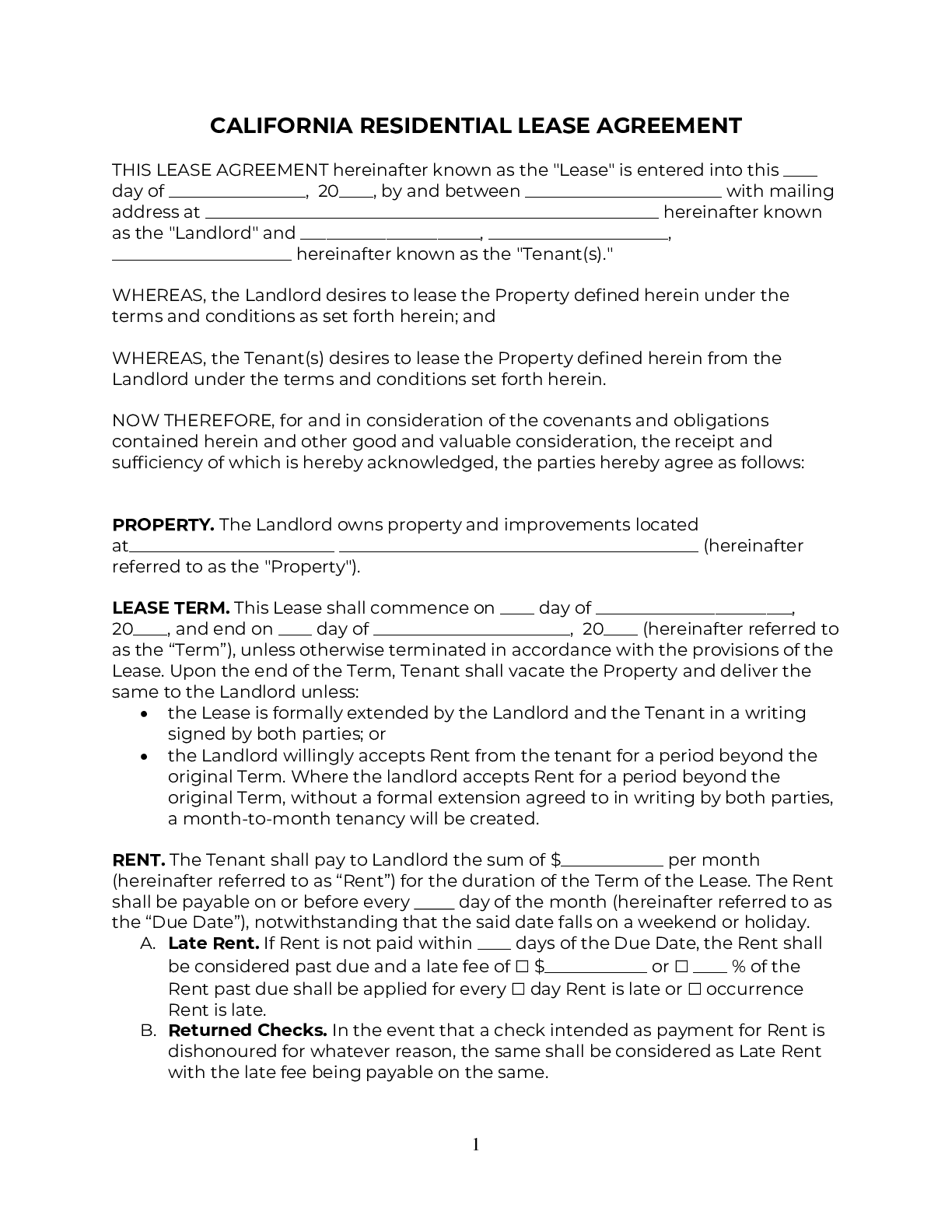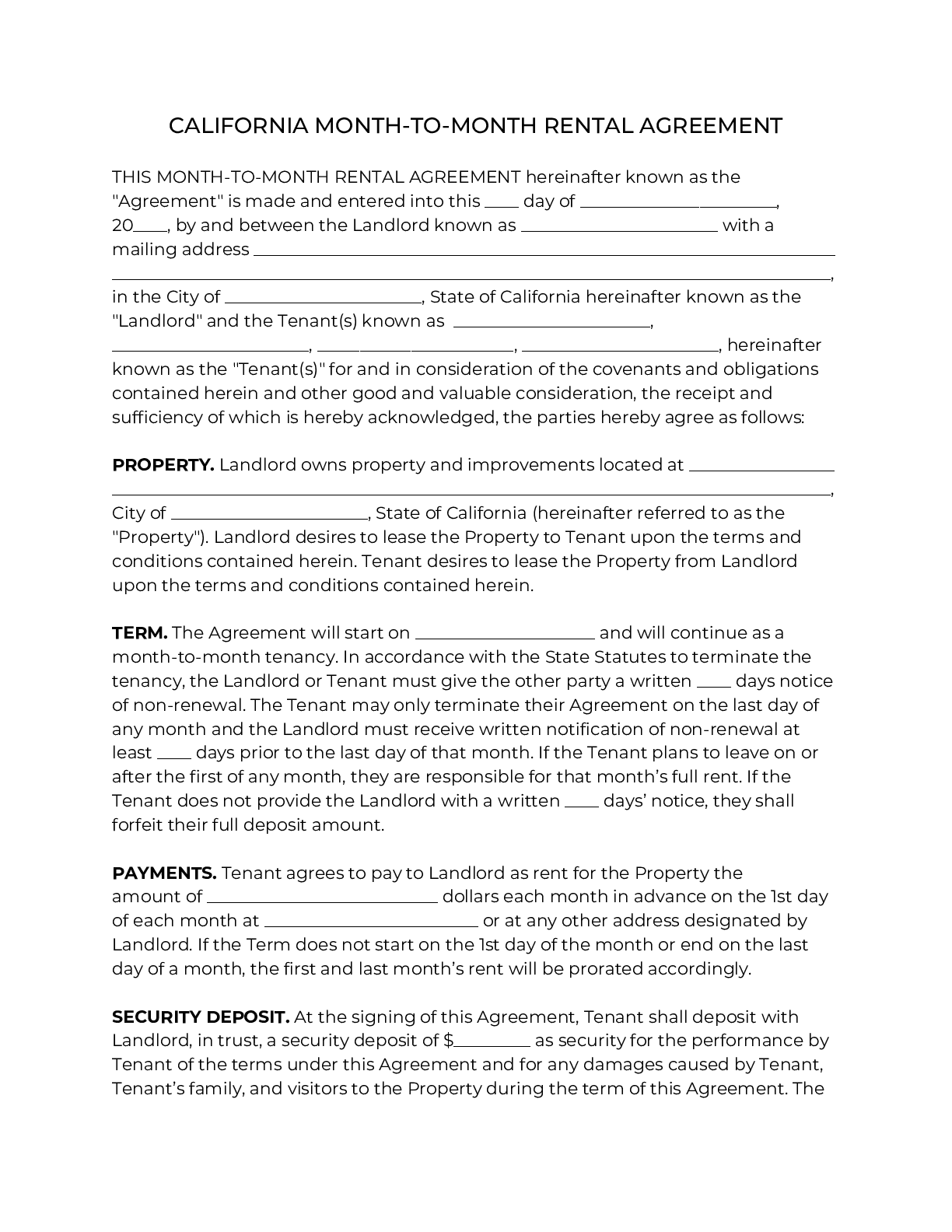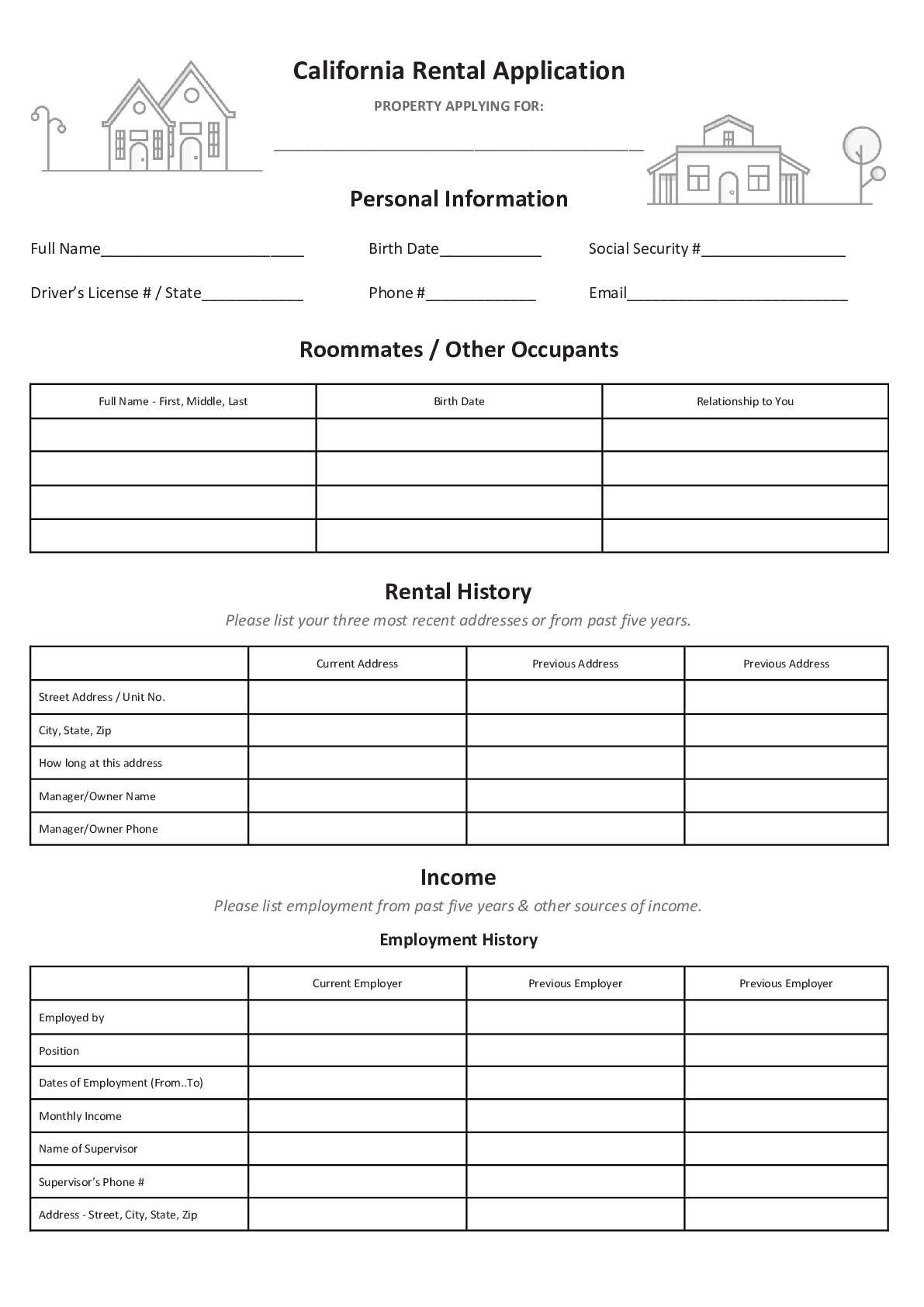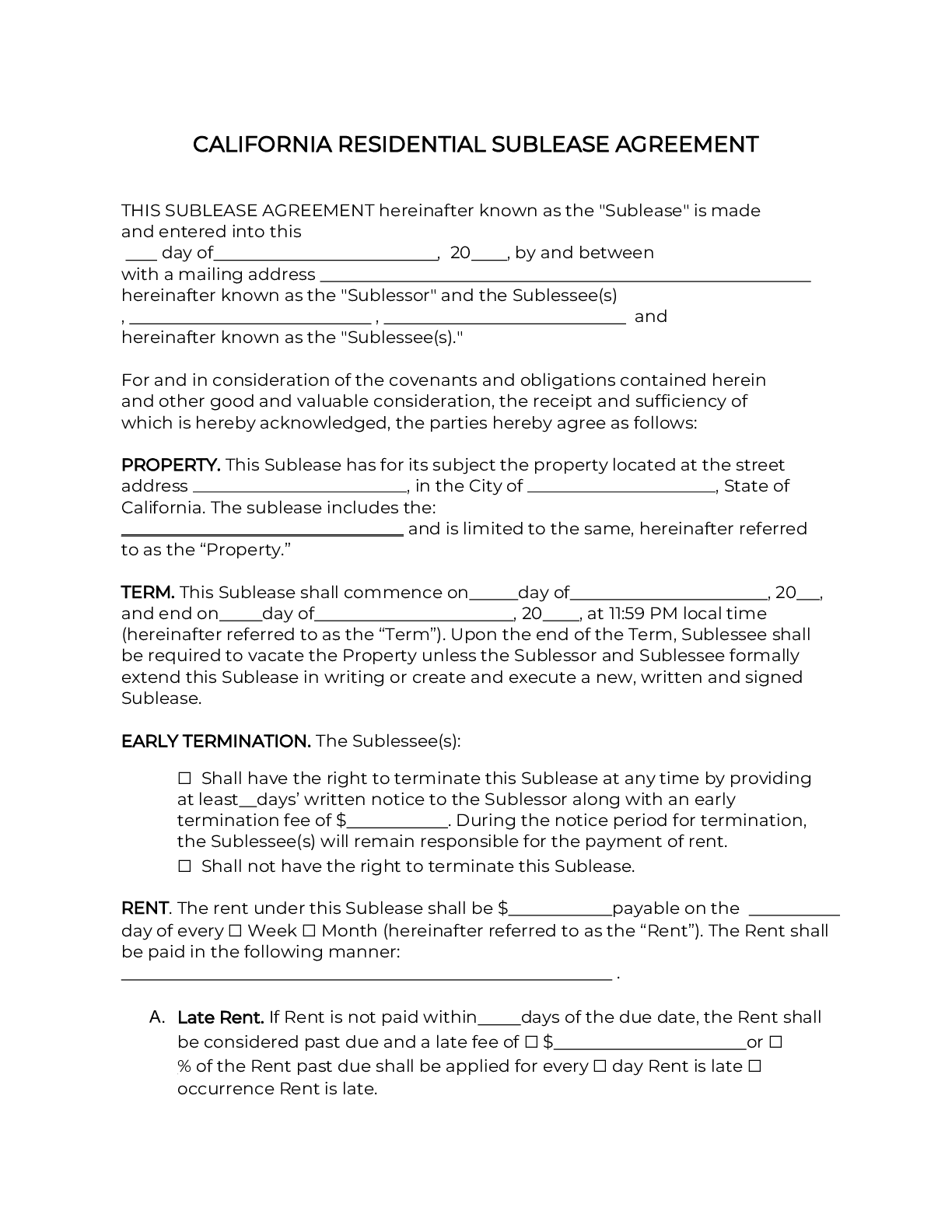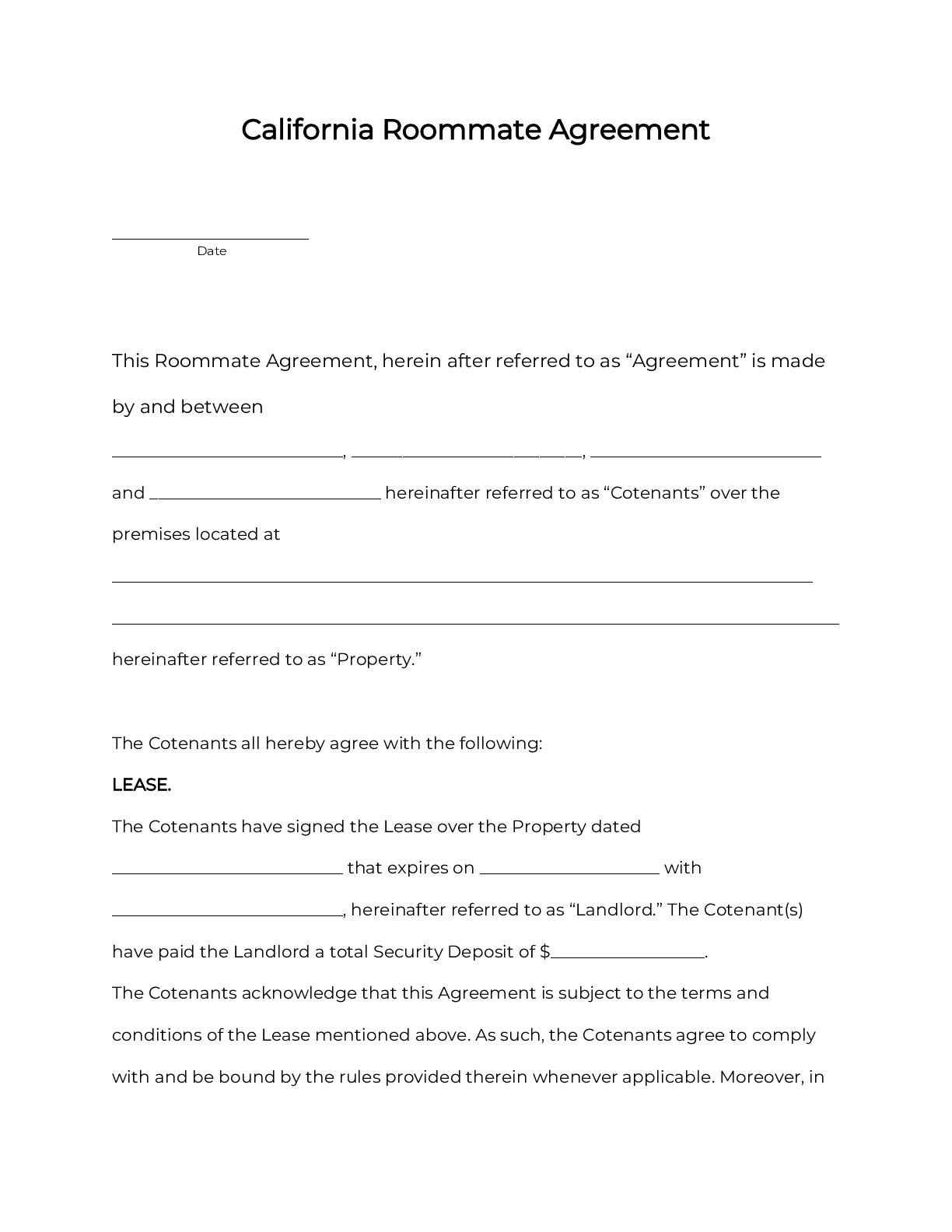A California rental agreement is a legal contract between a landlord overseeing a rental property and a tenant using the property. California landlord-tenant law governs and regulates these agreements.
California Rental Agreement Types
California landlords may use a rental application form to screen potential tenants. A rental application collects information about rental history, income, and other information that would help the landlord decide whether the applicant is a good fit for the property and rental terms.
A California roommate agreement (“room rental agreement”) is a legal contract between two or more people (“co-tenants”) who share a rental property according to rules they set, including for things like splitting the rent. This agreement binds the co-tenants living together, and doesn’t include the landlord.
Common Rental Agreements in California
California Association of Realtors Residential Lease/Month-to-Month Rental Agreement – Members of the California Association of Realtors (CAA) use this template. It details many rules and procedures, including return of security deposits and reporting maintenance needs.
California Required Lease Disclosures
- Methamphetamine Contamination Disclosure (required for some leases) – California landlords must disclose potential methamphetamine contamination in the rental unit. This is a requirement unless there are documented safe levels of 1.5 mcg/100 cm^2 after treatment.
- Mold Disclosure (required for some leases) – California landlords must disclose any knowledge of potential toxic mold in the rental unit.
- Sex Offender Registry Notice (required for all leases) – California law requires every lease to include a notice stating the sex offender registry is available on the Department of Justice website.
- Demolition Permit Disclosure (required for some leases) – California landlords must provide notice about the date of any upcoming planned demolition in the lease. This lets tenants know ahead of time when their lease will end.
- Military Ordnance Disclosure (required for some leases) – California leases must disclose when they are within one mile of retired ordnance storage or military training grounds.
- Death in a Rental Unit Disclosure (required for some leases) – Unless due to HIV/AIDS, California landlords must (before the lease begins) disclose all deaths in the rental unit within the last three years.
- Pest Control Disclosure (required for some leases) – California landlords must describe any regular pest control treatments in the lease. They must also provide notice of their right to displace a tenant for 24 hours to perform pest control, so tenants can plan to leave the premises during scheduled treatments.
- Shared Utility Arrangement Disclosure (required for some leases) – When California buildings share a master meter, the landlord must disclose how utility charges are allocated between each party, to help avoid billing disputes.
- Bed Bug Disclosure (required for all leases) – California landlords must include a bed bug addendum and/or disclosure in every lease agreement. This informs prospective tenants about infestation treatment procedures.
- Flood Zone Disclosure (required for some leases) – California properties which fall within a flood zone cannot be rented without disclosure of the hazard. The notice must have a minimum 8-point font and detail flood zone, resources for learning more, and a recommendation for flood and renters’ insurance.
- Smoking Policy Disclosure (required for some leases) – California landlords of multi-unit properties may restrict the smoking of tobacco products. If they do so, they must provide and publish a smoking policy for tenants.
- Asbestos Disclosure (required for some leases) – California leases with potential asbestos contamination (built before 1979) must provide a lease disclosure. Landlords must inform tenants about suspected contamination sites, testing, and risk management.
- Lead-Based Paint Disclosure (required for some leases) – Landlords must provide an EPA-approved disclosure and informational pamphlet to tenants renting any property built before 1978.
To learn more about required disclosures in California, click here.
City-Specific Lease Templates
Many cities in California have specific required and recommended disclosures. Here are major cities with residential lease agreements that differ from the state template:
California Landlord Tenant Laws
- Warranty of Habitability – California landlords can only rent out habitable property. This means providing certain basic health and safety features like hot and cold running water, smoke detectors, and garbage containers. Landlords must repair any issues within 30 days of proper notice. Failure to repair lets a tenant repair and deduct, or withhold rent.
- Evictions – California landlords may evict for rent nonpayment, lease violations, or illegal acts, among other things. Before filing eviction, landlords must serve tenants with prior notice to pay, comply, or quit, depending on the eviction type. Typically, the eviction process can be completed in a week to a few months. However, California properties covered by the CARES Act may be federally entitled to a minimum 30 days of advance notice before a landlord can file eviction for nonpayment of rent or fees.
- Security Deposits – California landlords may charge up to 1 months’ rent as a security deposit in most cases, with some exceptions for very small-scale landlords. A landlord must return any unused part of a tenant’s security deposit within 21 days after move-out.
- Lease Termination – California lets tenants terminate a month-to-month lease with 30 days of advance notice (seven days, for week-to-week tenants). Terminating a fixed-term lease early requires (in most cases) active military duty, landlord harassment, uninhabitable property, or domestic abuse.
- Rent Increases and Fees – California has statewide rent control, and local areas may also regulate notice or allowed amount for a rent increase. By contrast, fees only have to be “reasonable.” There’s an exception for a bounced check fee, capped at $25 for a first time and $35 for subsequent returned checks. California doesn’t allow fees related to payment by check (including for a security deposit) or when issuing a termination notice.
- Landlord Entry – California landlords may enter rental property between the hours of 8:00 AM and 5:00 PM on weekdays, for reasonable business purposes like maintenance, inspections, and property showings. Before entering, they must provide at least 24 hours of advance notice, except for emergencies.
- Settling Legal Disputes – California lets small claims courts hear landlord-tenant disputes, as long as the amount in controversy is under $10,000 and doesn’t include an eviction claim. California only allows a person (or corporation) to file 2 small claims worth more than $2,500 in any 12-month period.
To learn more about landlord tenant laws in California, click here.
Sources
- 1 Housing Authority of the City of Alameda, Eviction Protection Kit at p. 2 (created Jul. 12, 2024)
-
Properties and tenancies that are covered under the CARES ACT must be provided 30 days’ notice to vacate for non-payment of rent.
=====
Caution: There is not yet any statewide judicial guidance in California regarding the CARES Act requirements. As noted above, the City of Alameda officially states a 30-day notice is required for nonpayment of rent or other fees. An Alameda court case from June 2024 confirms this. While not an official resource, California Association of Realtors guidance from May 2023 agrees that the law appears to require a 30-day notice to evict for nonpayment of rent or other fees, in properties covered by the CARES Act.
Source Link - 2 Ca. Civ. Code § 1950.5(c)(1)
-
…a landlord may not demand or receive security, however denominated, in an amount or value in excess of an amount equal to one month’s rent, in addition to any rent for the first month paid on or before initial occupancy.
Source Link - 3 Ca. Civ. Code § 1950.5(c)(4)(A)
-
Notwithstanding paragraph (1), a landlord may not demand or receive security, however denominated, in an amount or value in excess of an amount equal to two months’ rent, in addition to any rent for the first month paid on or before initial occupancy if the landlord meets both of the following requirements:
(i) The landlord is a natural person or a limited liability company in which all members are natural persons.
(ii) The landlord owns no more than two residential rental properties that collectively include no more than four dwelling units offered for rent.
Source Link - 4 Cal. Civ. Code § 1719(a)(1)
-
Notwithstanding any penal sanctions that may apply, any person who passes a check on insufficient funds shall be liable to the payee for the amount of the check and a service charge payable to the payee for an amount not to exceed twenty-five dollars ($25) for the first check passed on insufficient funds and an amount not to exceed thirty-five dollars ($35) for each subsequent check to that payee passed on insufficient funds.
Source Link - 5 Cal. Civ. Code § 1946.1(i)
-
A landlord or its agent shall not charge a tenant a fee for serving, posting, or otherwise delivering any notice, as described in this section [regarding lease termination].
Source Link - 6 Cal. Civ. Code § 1947.3(b)
-
A landlord or its agent shall not charge a tenant any fee for payment by check for rent or security deposit as described in this section.
Source Link




